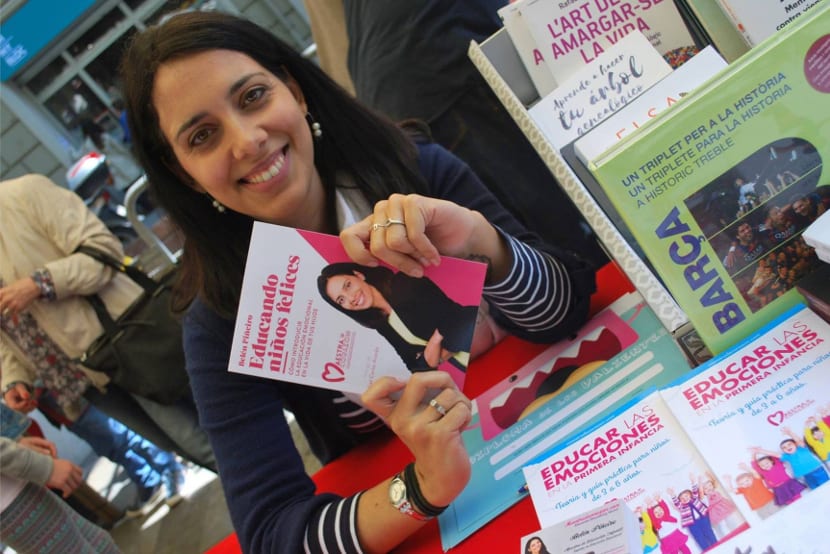
Spanish education may not be going through its best moments (that is clear). But what I am convinced of is that there will always be professionals who will try to fight for a new educational system and who will strive to raise awareness in society that a change is urgently needed in the classroom. Very urgent. One of those people is Belén Piñeiro.
Belén Piñeiro is a teacher at heart specialized in neuropsychology and education. A professional who is clear that Spain is not doing things well when it comes to education. After working in several European countries and observing different methodologies, she has developed her own Educational Intervention Program focusing on emotional and social education. Do you dare to continue reading Belén Piñeiro's interview for Madres Hoy?
Madres Hoy: First of all, Belén, thank you very much for having accepted the interview for Madres Hoy. It's a real pleasure to have you here. In 2015, experts were talking that 2016 was going to be the year of pedagogical renewals. Do you think it has been or that there is still a long way to go?
Belen Pineiro: I think that every year it is more evident that a change is needed in the educational system and in the way we educate and evaluate children. So far, 2016 has been the year in which this appeal has become most visible. There is still a long way to go, but the important thing is that we have already started walking.
MH: Lately we hear a lot about "Emotional Education", but wouldn't it be more correct for adults to learn to attend and accept childhood emotions?
BP: How to attend and accept an emotion in a child that you do not know how to recognize or manage in yourself? It is practically unfeasible for an adult to teach a child to read or add if he does not know how to do it. The same goes for emotions. If you don't know how to manage your emotions, you can't teach the child to do it. The first step in responding to the emotional needs of both children and adults is "emotional literacy." Naming what we feel and knowing how to identify it.
MH: What is positive discipline and what benefits does it have for families and children?
BP: Positive Discipline is an educational methodology that aims to dprovide parents and educators with strategies to be kind and firm at the same time, with the main objective of teaching the child basic life skills. It is an educational model that aims to understand the behavior of children and how to approach their attitude to guide them on their way always in a positive, affective, but firm and respectful way for both young and old.
Right now I am offering a Positive Discipline course geared towards parents and teachers. You have more information about it, here

MH: Ken Robinson says that "schools kill creativity." Do you think creativity is a pending subject in most schools?
BP: Creativity is one of the most valuable qualities of the human being. Our inventiveness, to generate new ideas, is one of the few things that machines still cannot do for us. Killing our creativity is taking away a large part of our potential. The school should help us to exploit, express and direct our creative capacity towards a goal, rather than encourage its disappearance.
MH: There are schools that have introduced Emotional Education as an evaluable subject. But, shouldn't the emotions be worked on in a transversal way and in all classes?
BP: The evaluation is fine as long as it is done as a follow-up of aspects to improve, both by the students and the teacher or the school and not used as a pressure tool. Of course, it is better to have emotional education as one more subject than not to have it, it is a good start and for those first steps I published my first book: Educating emotions in early childhood, which includes an intervention plan to take to classrooms.
But, having taken the first steps, Ideally, it should be permanently present in the classroom and that all teachers have the necessary training to deal with these issues. If a child has suffered a bullying situation on Monday morning, that conflict should be dealt with when it happened and not wait for the moment when they “touch” the emotional education subject during school hours.
MH: Are limits and norms incompatible with positive discipline?
BP: No, limits also exist in positive discipline, only that children are also involved in creating the rules (to the best of their ability) and that makes them much more willing to comply with them. We respond better to something consensual than to an imposed norm.
MH: Is society obsessed with grades, tests, and grades?
BP: It is what we have been taught to value in the industrial age. Children were rated "smart" or "dumb" based on their skills in subjects such as math, language, or their memory ability. School grades were a measure of abilities and also of "success" in life. Today we know that good grades do not guarantee success, not only on a personal level, but also on a professional level.
MH: An emotion for every moment ... although why do you think some of the emotions are perceived as negative?
BP: We have that concept because the way of expressing those emotions can be harmful, both for those who feel that emotion, and for those around them. In addition, there are certain emotions that have a negative “stigma” depending on what context. It is well seen that a small child cries, but that expression of sadness is not so accepted in adults. The same goes for anger and women. There are still those who call them "hysterical" as a negative denotation and, curiously, that word comes from "uterus".

MH: What are the benefits of neuropsychology in the classroom?
BP: As JA Marina states: “Educating is the only job whose purpose is to change the human brain every day. It must be kept in mind so as not to be irresponsible". How is it possible then that a teacher does not have the slightest idea of how our brain is structured? Our attention, our memory, our motor skills, our emotions, our logical-mathematical thinking ...
Everything that is worked on in the classroom is in the brain, that is why it is essential that an educator has knowledge about these topics and not only that, but also incorporates this learning to practical work in the classroom, to their way of teaching and to the way in which you understand student learning. This is what neuropsychology brings.
At the moment I am offering a Neuroeducation course, aimed at both parents and teachers. You have more information about it, here.
MH: Six-year-olds are stressed and overwhelmed. What do you think it is due to?
BP: It is very sad. Childhood lasts less and less. I recently read an article that said “The schedules have swallowed up our children. Children have been mini-adults”. Children no longer have time to be children, to invent, to imagine, run, jump ... Nor get bored! With how important all this is ... We have relegated their day to day to the school day chained to endless extracurricular activities, homework and directed activities. The little ones in the house have longer schedules than their parents… it's a real shame.
We have relegated the day to day of the little ones to the school day chained to endless extracurricular activities, homework and directed activities
MH: There are more and more innovative and alternative schools, but are there teachers who refuse to change the way they teach despite everything?
BP: Unfortunately, there are. There are teachers who have settled in doing their work and do not want to leave their comfort zone. Despite the fact that education is a vocational profession, there are educators who have lost their enthusiasm and simply repeat the same programming year after year.
MH: Is it necessary for teachers to train in emotional and social education?
BP: Of course. Science has shown that emotion is directly related to learning. In addition to that our state of mind influences all aspects of our life. Knowing how to manage our emotions will be a very useful tool in our life, unlike many other knowledge that is taught in the traditional school. How many times have you needed to take a square root manually? However, how many times have you been carried away by anger or sadness without knowing what to do to return to a state of calm?
MH: Is punishment the best option so that the child does not repeat a behavior?
BP: I am not going to say that punishments do not work, because it is true that in the short term they eradicate unwanted behavior on the part of the adult. The problem is that they do not know their long-term effects and the feelings they provoke in the child: rebellion, resentment, damaged self-esteem and submission.
It would eradicate classrooms as we know them. It does not make sense for children to spend 8 hours sitting at a desk looking at a blackboard, it is completely unnatural.
The main problem when it comes to eliminating punishment is that most parents and educators think that the only alternative is permissiveness. As we have seen in the first point, sometimes we confuse discipline with authoritarianism and permissiveness with affection.
MH: What five things would you change as an education professional in the educational system?
BP: I would change the following:
- It would change the main character of the classrooms. I would stop being the teacher, would be the students.
- It would eradicate classrooms as we know them. It does not make sense for children to spend 8 hours sitting at a desk looking at a blackboard, it is completely unnatural.
- It would delete the school notes as we know them. The evaluation is one more tool to know the teaching-learning process.
- The content and volume of the subjects. Storing certain data no longer makes sense. We have all forgotten 80% of what we have studied in our school years.
- The teaching methodology. A radical change is needed. Fortunately more and more schools are committed to educational innovation and they use other methods such as Project Based Learning.
MH: Belén, thank you very much for the interview. But I would not like to say goodbye without first asking you something: why do you think it is so important to educate on emotions?
BP: Because they are part of us, they will accompany us throughout our lives. Knowing how to accept and regulate them will make us know each other better, love each other more and make better decisions. It will make our relationship with ourselves and with others easier. They are all advantages ... don't you think?
As you have been able to read, Belén Piñeiro is a teacher at heart who fights with all her desire for an urgent educational change and for renovated classrooms. Hopefully 2017 is the year in which the majority of schools and educational centers apply active and innovative methodologies to make students the protagonists of their own learning.
What did you think of the interview with Belén Piñeiro? I have learned a lot from her. I hope you have found it useful and interesting!